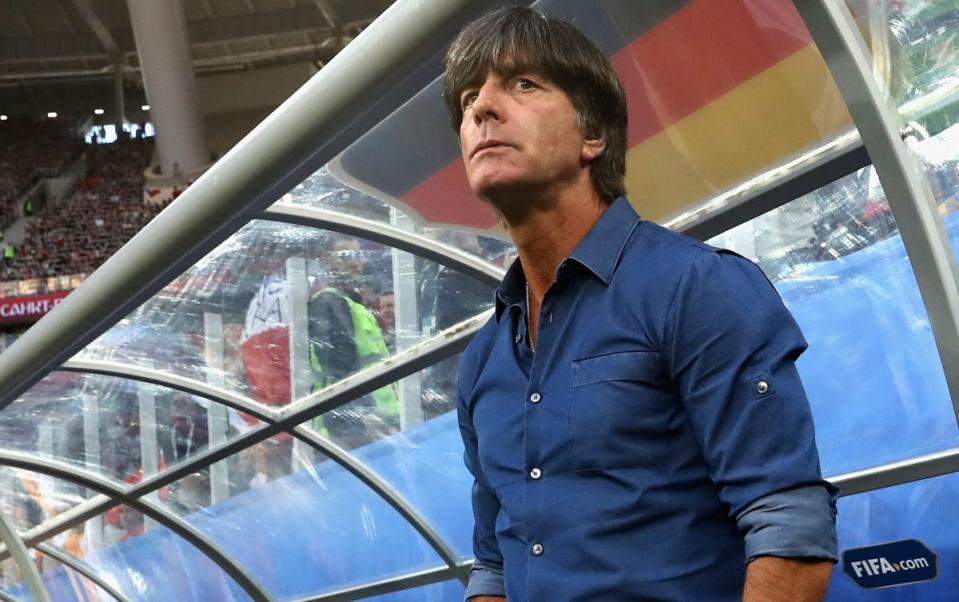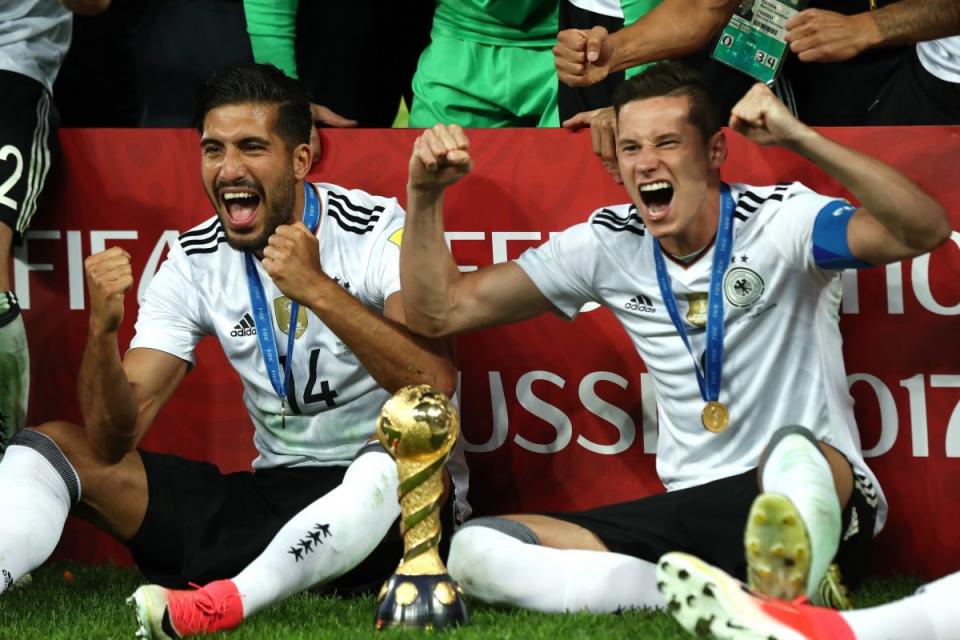What does Germany sweeping major international tournaments mean for the World Cup?

Germany is the world champion, lifting the World Cup in 2014. Germany is, as of Sunday, also the champion of the only other global national team tournament, the Confederations Cup. On Friday, Germany won the under-21 European Championships.
The latter was a bit of an upset, as a loaded Spain team was expected to win the final before the Germans snuck a 1-0 result. And perhaps Die Mannschaft was a tad fortunate to lift the Confederations Cup as well, given the perpetual assault by Chile it survived in the second half of another 1-0 win.
But to look too closely at the performances and the manner of the victories is to miss the point. Germany sent its B-team to the Confederations Cup, leaving an absurd amount of talent at home because manager Jogi Loew wanted to see some new faces.
A reminder that Germany have these guys to come back for the World Cup pic.twitter.com/DGzacf58Kv
— B/R Football (@brfootball) July 2, 2017
Loew more or less knows what his starting team for next World Cup will look like, so he decided to use this dress rehearsal in Russia to give minutes to fringe players and a whole raft of younger talent. He brought eight players born in 1994 or later, who would have been eligible for the under-21 Euro.
They included no less than defenders Joshua Kimmich and Matthias Ginter; midfielders Emre Can, Julian Brandt and Leon Goretzka; and forward Timo Werner. All of them are bright young stars on the club scene. As such, Loew essentially stripped most of the youth national team’s starting lineup, gave it prominent roles on the senior team and beat the champions of every continent anyway.
Which is to say that Germany’s senior team won a major international tournament with a bunch of scrubs and kids. And the under-21s became champions of Europe without their eight best players.
If Germany is the world’s best team, the joke was made going into the final, its B-team is probably the second best.
[ Follow FC Yahoo on social media: Twitter | Facebook ]
So, with less than a year to go until the World Cup, what are we to make of all that? Can Germany become the first team since Brazil in 1958 and 1962 to repeat as champions? The only other team to have done it was Italy in 1934 and 1938 when lots of countries still didn’t bother with the World Cup, or weren’t playing soccer terribly seriously yet.
There’s probably no sense of making a whole lot out of the fact that no Confederations Cup winner has ever gone on to win the World Cup. Because no team had ever won the Euro after winning the World Cup. And then France did it and then Spain did it again 12 years later. These are exercises in pointless correlations.
And it might be a precedent shattered by Germany. Because what’s so remarkable about this team is that it is aging out of a golden generation — or already has, perhaps — yet rolling right into the next one, while a third is at the height of its powers with Manuel Neuer, Mesut Ozil, Toni Kroos, Thomas Muller and Mats Hummels. The 2014 World Cup was the culmination of the international careers of Bastian Schweinsteiger, Philipp Lahm, Miroslav Klose, Lukas Podolski and Per Mertesacker. Yet here we are, with another wave of potential world-beaters showing up.
In Germany, all the generations now seem to be golden.

Some golden generations never manage to win anything. Like the Netherlands team of 1996 through 2004. Or the Portugal side of the same years. Or indeed the current Argentina batch, which has been the runner-up in three major tournaments in a row, managing to lose the 2014 World Cup final, the 2015 Copa America final and the 2016 Copa America Centenario final — all either in extra time or on penalties.
Germany has been very good for a few years, and will likely continue to be so for a long time. It’s unclear who deserves the credit. Jurgen Klinsmann for shaking up the federation. Loew for putting the actual team on the field. The entire soccer scene for doubling down on youth development and embracing technique and style to go with that signature brawn and grit. Probably all of the above.
This guarantees nothing, of course. The reason so few teams have repeated as World Cup champions is that when you play four straight knockout games, the margin for error is, well, non-existent. One shot, or one call, or one foul, or one pass played left rather than right, a ball not entirely cleared, a stumble, a touch from a glove, can swing everything. There’s an inordinate amount of luck involved in making a deep run, let alone winning eight straight equivalents to a “Game 7” over the course of four years.
So it’s still more likely that somebody else wins the 2018 World Cup. Germany will be in the thick of it though. Next summer and, if the Confederations Cup taught us anything, for many summers thereafter.
Leander Schaerlaeckens is a Yahoo Sports soccer columnist. Follow him on Twitter @LeanderAlphabet.
More soccer coverage from FC Yahoo:
• Germany makes early goal stand up to beat Chile, win Confed Cup
• Portugal beats Mexico in extra time, claims third place in Russia
• Video Assistant Referee is here, and it’s not working so far


